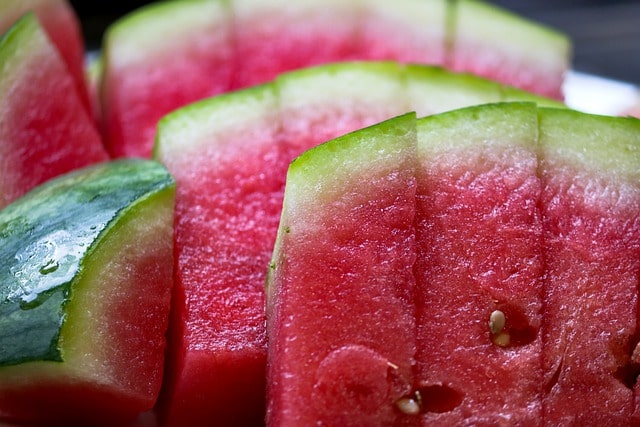Watermelon the delicious flavourful hydrating fruit, full of vitamins consumed all around the world as summer staple in form of cut fruits, juices, candies, icecreams, vinaigrette and yoghurt.
Vine flowering plant from family cucurbiteceae originated from Africa, mainly grown in tropical to temperate regions. It is an hard rind edible berry with no divisions internally and sweet juicy flesh in reddish pink colour filled with black seeds.
Watermelon Allergy
Allergy is an immunological response against a foreign substance.
Food allergies are generally caused by pollens used in growth of fruits. While other people may be normal to them, some people may develop a sensitive reaction against it.
Watermelon comes bearing immense health benefits like
After all benefits it might come as a shock that this refreshing,juicy summer staple can be a minor threat to few people.
Although very rare , but allergic reactions to watermelons are possible.
Causes of watermelon allergy:
There are three major allergens in watermelon, which may elicit an allergic response are:
It has an allergy-provoking protein similar to ragweed pollen, if you are allergic to ragweed pollen there are chances that you may be allergic to watermelon.
Sensitivity may also be due to the body’s inability to recognize certain proteins leading to the production of antibodies against watermelon even though watermelon is harmless to the body.
Symptoms of watermelon allergy:
Symptoms of watermelon allergy could be experienced in a matter of a few minutes or maybe in hours depending on the response the immune system produces.
The symptoms though are very similar to the usual food allergy symptoms and include:
Like any other allergies, these symptoms if treated carelessly may proceed to anaphylaxis stage symptoms of anaphylaxis could be seen as:
Symptoms of anaphylaxis for watermelon allergy may occur very rarely but may be life-threatening hence medical attention is to be sought as soon as possible.
Cross-Reactivity in watermelon allergy:
People who have an allergy to ragweed pollen may develop an allergic response towards watermelon. This response is known as cross-reactivity.
Cross-reactivity occurs when antigens present in body trigger an antagonistic or allergic response towards a substance or protein in food.
Fruits and vegetables belonging to same family as that watermelon may develop an allergic reaction upon consumption and cause cross-reactivity.
For example: if you are allergic to watermelon chances are that you might be allergic to cucumber and zucchini too
Hence it is very important to test and know about the food that may trigger the allergic response.
Also Read: Cucumber allergy Symptoms
Enquiring about the ingredients in the meals before ordering may be helpful in preventing any such situations.
Diagnosis of watermelon allergy:

Self-observation test:
In order to attain the diagnosis of the allergy and to know about the type of allergy, one has they must visit an allergist first who will perform the skin prick test which will help in determining and confirm about the presence of allergens that are causing the allergic reaction.
Skin prick test:
An allergist will advise you to get a skin prick test inorder to identify the type of allergy you have.
Here in case of watermelon allergy, they prick the skin by placing a small piece of watermelon near it and wait for a sensitive/antagonistic response to be triggered.
The response may be a small bump in place of contact or rash may be developed near the area of contact.
Blood tests may also help to determine the allergy.
Oral food challenge test:
In certain cases people show a positive test response for the allergy but have no allergy symptoms, in the doctor may ask to get a challenge test done i.e the person is asked to eat a little amount of food, and the reaction is monitored under clinical observation.
After the tests when the allergen is confirmed, one must avoid the food containing it all other foods belonging to the same family should also be avoided.
Having an epinephrine auto-injector pen (epi-pen) generally helps as first aid.
Minor allergic responses can be treated by OTC antihistamine medications.
It is best to consult an allergist/medical specialist to attain proper advice about the precautions to be taken.
In case of anaphylactic response trigger like difficulty in breathing or swallowing always seek medical help as soon as possible.
Once the allergist confirms the allergy always have an epi-pen with you for cases of emergencies.
Upon accidental ingestion, if an allergic reaction is triggered remove the piece from the mouth immediately and rinse your mouth thoroughly this may help to lower the symptoms to a certain extent.
Have a look at the ingredients when visiting a restaurant helps to avoid the food containing watermelon or any other food coming in from a similar family.
Eliminate watermelon from your diet completely and in all cases avoid food that may contain traces of watermelon.
Read the label carefully before buying food products.
Watermelon has a high amount of glucose, lycopene, and potassium which may cause elevated glucose levels, nausea, bloating, and diarrhea hence over consumption should also be avoided.
Watermelon allergies are very uncommon but in rare situations when you are constantly exposed to allergens the allergy may become life-threatening .therefore taking precautions and avoiding food containing watermelon is very important.

